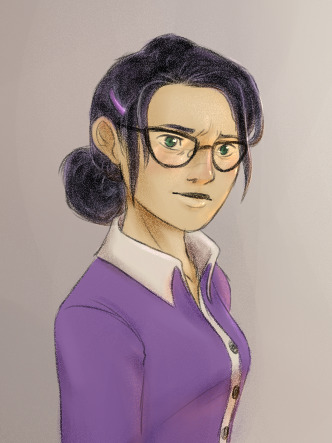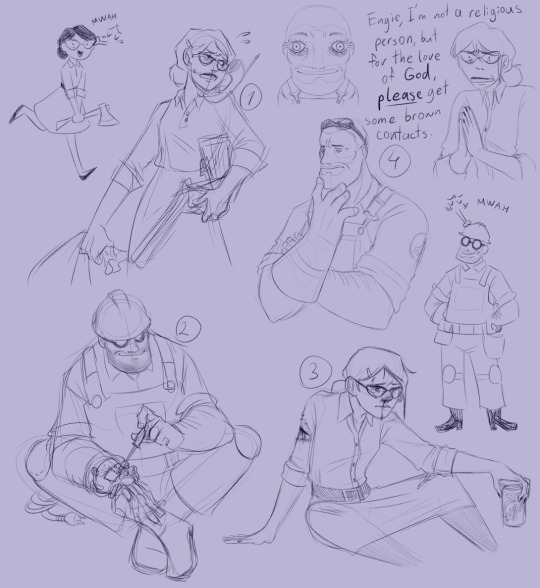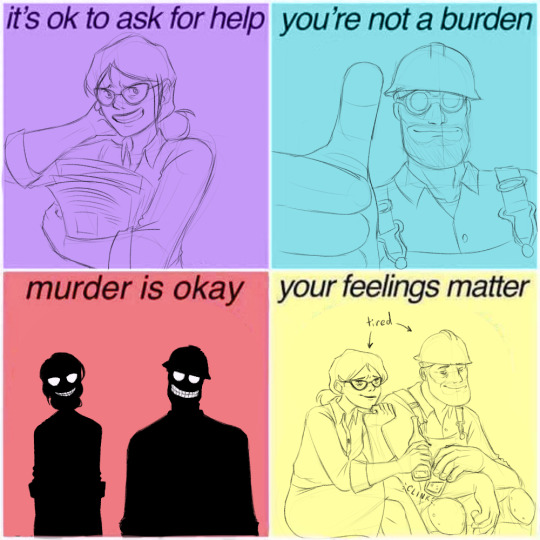#i definitely have same-face syndrome. and same-body syndrome. and a *bad* comfort zone when it comes to drawing women. working on it though
Text


Tried imitating those cool portrait poster thingies with my two faves to celebrate my one hundred hours of having played the game. More doodles of lesser quality under the cut.


I just. I like them both so much. They are so sick and twisted, with such messed up implications in the lore, and they're also just silly little guys... :-)
#team fortress 2#tf2#miss pauling#miss pauling tf2#dell conagher#engineer tf2#i definitely have same-face syndrome. and same-body syndrome. and a *bad* comfort zone when it comes to drawing women. working on it though#yes i want to hold hands with both of them sue me for having fucking taste!! i guess my *real* type is just Stressed People.#you can see me flip-flop between heavy referencing and going off of memory and just doing whatever i want <3#blood#blood tw#blood cw#because of pauling's bloody nose yeah.
33 notes
·
View notes
Text
Week 4: My Head To My Heart
Daft, R. (2017). The Leadership Experience (7th ed., pp. Chapter 5). Boston, MA: Cengage Learning.
“Bring me back
Strong and sweet
Make the dream my reality
Lead me to my heart
Lead me to the beauty that will never fade
I will long to feel its true embrace
Why’s it seem so far
The road from my head to my heart”
– Head To My Heart Elenowen EP
On a day like today, this is what is playing over and over. For someone who is constantly caught up in idealism and beauty and a vision of something greater, it has become all the harder as I have moved through life. The world is unkind to optimists and so my mind has developed all these coping mechanisms and callousness that gets in the way of my freedom to be – my authenticity. The irony being that my head functions better (as do most employees apparently) when my heart is free to be, to export, to dream, and at peace.
From a psychological point of view, different parts of our brain respond to different situations. In order for us to logically think through things, to problem solve and to engage with creativity, we primarily use our prefrontal cortex – the higher order part of our brain. The problem with leading with fear instead love, on a intrapersonal level is that in the presence of fear or stress, the brain interprets it as danger (which is of course and wonderful and beautiful function that protects us against lions and other bad things), where really in a workplace, our lives shouldn’t feel like they’re in danger. In this situation, the brain activates the places that deal with the fear response: the hindbrain has very “primitive” responses and freezes like a deer in the headlights, at which point you no longer can add value to your situation because everything else shuts down; and the amygdala which is responsible for the fight or flight response which may show itself as avoidance or being defensive, in an effort to self-protect and then good ideas cannot arise. On a biological level, your body begins to shut down all process that aren’t deemed necessary for survival, your sympathetic nervous system takes over involuntarily and pumps adrenaline and you can’t think straight. You don’t choose it. It’s your body’s natural reaction to perceived threats when your environment is controlled by stress. This can lead to the cycles in the General Adaptation Syndrome where stress takes over, so you try to combat it by trying harder, and the greater expenditure of scarce resources causes burnout to occur at which point you are completely depleted of resources. This is a vitally important concept to grasp when leading oneself and others – the more grace, kindness and support you extend, the better the quality of the output will be, from a basic level of the brain's functionality.
A fully integrated person requires intrapersonal honesty, being able to sit with your flaws, mistakes and shortcomings, to give yourself space to experience the pain you carry, and know the effect of the pain you cause, and to work on who you are, what kind of person you want to be, and then how to get there. And that is the painful, wonderful, beautiful, fruitful road from your head to your heart.
A good leader needs to lead with the head and the heart.
What does this mean? Well for the longest while (and my personal frustration with the praise of the Age of Enlightenment) there has been a separation between mind and emotions, where rational thinking and good decisions have been viewed as the product of logical thought and the abandon the emotions – emotions being viewed as terrible things that skew ability to be effective. Of course, the world has realised the error of its ways or has begun to. I have seen so often the damage that is caused from invalidating emotions and shoving them under the rug. Some of our biggest hurts come from situations where we feel that we had no logical reason to be upset and then we don’t deal with it because it’s not allowed to exist. Or we become so emotional that we forget to look at the situation for what it actually is. Neither is correct, an integrated approach uses emotions as the warning light.
I drive a car that is older than I am and technologically very uncomplicated, but for a couple of months, my hand break light was on, even when I was driving. I remember double checking to make sure that my hand break was down – which it was. Some months later I was browsing through my car manual and discovered that this was also the light for my oil – so for months, I had been driving with no oil in my car.
This is the same with our emotions. Too often we ignore them because they’re not supposed or not allowed to exist, or they’re not justified in out books, and really when we ignore them we expose ourselves to detrimental failure and damage. (My car was fine, thank goodness.) Emotions don’t power the car or make the decisions, hey just let us know what’s going on under the hood. If we start paying more attention and becoming more attuned to our emotions and better able to understand why they exist and how to deal with them (using our head and being kind), we grow in maturity and in our own emotional intelligence through understanding. In a leadership context, this is important when a follower makes a mistake or does something wrong. We need to be able to understand why they did what they did, and that requires empathy (which is a whole other debate because it has its own biological origins and individual differences, such as the number of mirror-neurons one possesses) so as to be able to empower them and help them grow into the best version of themselves, but also, we need to be able to acknowledge that what was done was wrong and cannot be excused. In the same way, we should be able to analyse a situation where we feel upset or wronged or mad at someone and ask ourselves if our offence is the product or our own issues, such as a perceived slight or rejection, or whether it was of malicious intent by the other person. In this kind of a situation, emotions might push us towards addressing this injustice, when really there might be no injustice, and so we are confronted with a personal weakness (such as fear of rejection) which we are then empowered to confront and deal with. It is important to be able to validate emotions without skewing the truth: i.e. when my friend made this joke, I felt hurt, but that was not the intention or the reality, my hurt is valid and something I need to deal with, but I do not necessarily need to address my friend about it, because I was the one that took it out of context or too personally. Being hurt by a friend doesn't make the friend bad or a hurtful person and this ties into mental models.
I’ve spoken to many people and picked up on situations where they felt very hurt, which I’ve then brought to their attention. They very quickly explain it away with a: “Ja, but they didn’t mean it.” The head to the heart connection is severed here. The better response is “This really hurt me, and I know they didn’t mean it, and they are not hurtful people, but my emotion is valid and so is the fact.” We do ourselves no favours by shoving emotions under a rug. And really we begin to function more optimally when we can use all the parts of who we are, our intellect, our hearts, and our souls because all of them make up the core of our being.
When we can tap into all of this and completely throw ourselves into what we’re doing, there becomes this divine ecstasy we experience, where have a feeling of being beyond or outside of oneself, the brief moments of magic where we take complete joy in what we are doing. The feeling that we are doing exactly what we should be doing, that this is what we were meant to do. This is flow. And flow is what we crave in what we do.
St. Irenaeus said it this way “The glory of God is man fully alive.”
Flow is what it is to truly be alive, and for flow, we need to engage with the depths of our being.
We need to engage all our minds ability, to think bigger, to think better. We need to be able to think strategically and calculate, but not lose sight of the grandeur of the bigger picture, there are intricate systems of which we need to be aware and work into, we need to expand beyond what we can see into a global mindset, we need to pay attention to the small details, we need to think critically, functionally, logically, rationally, openly, abstractly, conceptually and not lose sight of the point. We need to be aware of our biases, and the flaws in our thinking, we need to be open to new ideas, new ways of thinking, but hold fast to the values and beliefs that ground us (all the while being open to the definition of what they look like to change) and we need to not be afraid of new ideas and imagination. To not be afraid of leaving the comfort zones for the growth zone, not afraid of failure or risk or the deep end. In an organisation this looks like a learning organisation that is constantly experimenting, learning and growing. All the while never losing the ability to see things for what they are, to stay curious, but to stay grounded – to call things out for what they are and to not be afraid of addressing bad judgements, and incorrect decisions – living sustainably with the future in mind. Responding to situations in the best way determinable, not in a formula. For this, good relationships are needed, which require emotional engagement by being ever-present and ever-ready for change, opportunity, growth individually and in the organisation. Developing a self-discipline that doesn’t waver in the face of the storm.
We need to not deprive ourselves of the gift we have been given in our hearts and minds, being able to call what is good, good, and what is not good, bad – and then to work towards the restoration of all things to that which is good. This is particularly true with emotions. As discussed, feeling bad emotions is not bad, it's the management of emotions (or emotional intelligence) that determines whether it is good or bad. Emotional Intelligence is correlated with better business performance and I don’t think enough organisations know that. Where fear rules, energy is taken up by emotional survival and work is strained and deprived of resources. We need to live with an open hand regarding ourselves and others, prorating relationships for genuine and authentic reasons where although it's hard, we build trusting relationships where we can all work together and depend on each other to contribute to co-motivate, co-empower, co-create, commit and to bring the best of our abilities for the good of the team. As the leaders, we must set the example and serve the team. making necessary sacrifices for the good of everyone, even when it hurts us. Let us never cease to acknowledge the greatness in others, or cease to call it out through encouraging them and loving them for who they truly are and not for who we think they should be.
Jobs are not just jobs, they are opportunities to connect, to build with others and to live out Community in the pursuit of something greater and the full expanse of expression, generously pouring out heart and soul, mutually, into the work being done. This is of course painfully difficult when you invest your entire self and come out short changed, or fail, and it takes courage and bravery to put yourself out there again. Give yourself time, heal, but never become cold or bitter – put yourself back out there, for the sake of your own wellbeing and for the greatness that lies within you. Be vulnerable, for your own sake. Act with integrity and honour, be kind and respectful, even when others are not. Be honest and open, let falsehood and lies stay far from you, and find a place of safety that remains constant been when life is not. Keep learning and keep growing, there is a higher call, a bigger mission, a transcendence which is yours and yours alone to find, where clarity of heart, spirits and mind exists and you are truly free to be all that you were made to be, where you are wholly loved and accepted for all that you are and all that you are not, and where grace and hope and peace are extended to you like shade on a sunny day.
In closing, I recall one story that has stuck with me for a long time. The story is of the sun and the wind that are arguing over who is more powerful. To settle this debate, they spot a man with a coat and make a bet as to who can get him to take it off first. The wind goes first and blows and blows, and as it gets colder and windier, the man clutches on to his jacket all the tighter. Eventually, the sun steps in for his turn. The sun shines, gently and radiantly, and within minutes, it is warm and the man takes off his jacket happily. The morale is this: leading with love instead of fear creates a safe place where people can truly engage with all that they are and the world is the better for it.
There are three quotes that when understood together, sum this up for me in my life:
“The future belongs to those that believe in the beauty of their dreams” – E. Roosevelt
“We do not believe in ourselves until someone reveals that deep inside us something is valuable, worth listening to, worthy of our trust, sacred to our touch. Once we believe in ourselves we can risk curiosity, wonder, spontaneous delight or any experience that reveals the human spirit.” ee cummings
“There are far, far better things ahead than any we leave behind.” C. S. Lewis
So, as Elenowen sings “One day I will get there.” and all I can do on days like this is make peace with the past, for the friend that it's been and the dreams it's given me, and take one step at a time towards the glorious future that is bursting with life and possibility.
0 notes